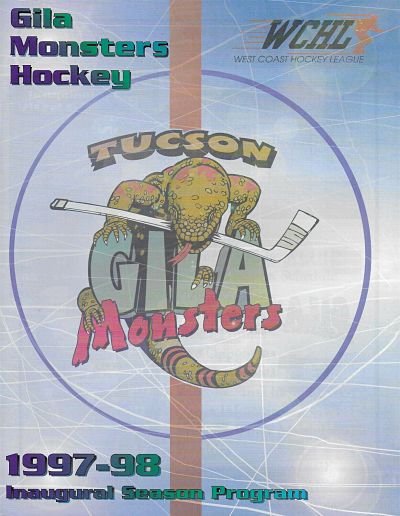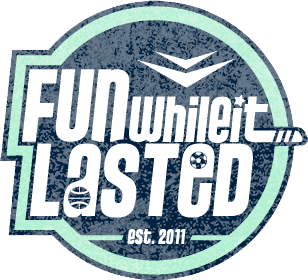West Coast Hockey League (1997-1998)
Tombstone
Born: 1997 – WCHL expansion franchise
Folded: December 2, 19981Pedersen, Brian J. & Peckham, Norman. “Monsters quitting Tucson”. The Citizen (Tucson, AZ). December 3, 1998
First Game: October 17, 1997 (L 7-4 vs. Phoenix Mustangs)
Last Game: December 1, 1998 (L 3-1 vs. Anchorage Aces)
Taylor Cup Championships: None
Arena
Tucson Convention Center
Opened: 1971
Marketing
Team Colors:
Ownership
Owners:
- 1997: John Barath, et al.
- 1997 – 1998: Stephen Mandel, et al.
Attendance
We have assembled a partial record of Tucson Gila Monsters attendance. Attendance for Tucson’s 13 home dates during the 1998-99 season is uncertain. The WCHL deleted all mention of the 21 home & road games that the Gila Monsters played that season from their record books and The Tucson Citizen did not include announced attendance in all of their game box scores.
The Internet Hockey Database lists Tucson’s home average attendance as 1,378 for the 1998-99 games, without listing a source. The Citizen claimed both 763 and 793 as the 1998-99 home average in a post-mortem published after the team folded in December 1998, without explaining the discrepancy.2Pedersen, Brian J. & Peckham, Norman. “Monsters quitting Tucson”. The Citizen (Tucson, AZ). December 3, 1998 There are enough different figures flying around here that we haven’t chosen a definitive number for 1998-99.
Source: 1999-00 WCHL Information Guide
Background
The Tucson Gila Monsters were a perpetually troubled minor league hockey outfit that player one full season and part of a second at the Tucson Convention Center in 1997 and 1998. Tucson was the southernmost outpost in the West Coast Hockey League, a low-level circuit whose membership included nine clubs that stretched up the Pacific coast as far north as Anchorage, Alaska during the 1997-98 season.
The Gila Monsters played at the Tucson Convention Center, the same building that housed the city’s two prior flirtations with professional hockey during the 1970’s. The Tucson Mavericks (1975-76) and the Tucson Rustlers (1978-79) both skated only a single season before going out of business. The Gila Monsters would fare no better some twenty years later.
In Competition
The Gila Monsters were in trouble from the jump. One of the team’s original investors pulled out just as the Monsters’ debut season got underway in October 1997. The Monsters reportedly opened the 1997-98 season with only 15 season ticket holders.3Pascoe, Bruce & Heltsley, Ernie. “Monster money mess: club files for bankruptcy.” The Daily Star (Tucson, AZ). December 23, 1997
In December of the same year, the team filed for Chapter 11 Bankruptcy. The team managed to re-organize and complete the 1997-98 WCHL season, finishing with the worst record (16 wins, 43 losses, 5 over-time losses) and lowest announced attendance (1,655 fans per game) in the nine-team league.
24-year old Canadian center Chris Everett was Tucson’s leading scorer during the 1997-98 campaign with 31 goals and 42 assists in 58 games. But Everett would not return for the 1998-99 season. In fact, according to the Internet Hockey Database, Everett would never play another game of pro hockey after leaving Tucson.
The Monsters put a stronger club on the ice for the 1998-99 season under returning Head Coach Marty Raymond. But fan interest remained nearly non-existent and out-of-town owner Stephen Mandel pulled the plug after only 21 games. The Monsters were 7-11-3 at the time. The team’s players were placed into a dispersal draft and scattered to the winds.
Struggle To Survive
Long-time Tucson hockey scenester and historian Timothy Gassen, writing for The Arizona Daily Star in 2016, posited several reasons for the Gila Monsters failure. Gassen suggested that the Monsters’ Edmonton-based owners fundamentally misjudged the Tucson market, notably local fans’ loyalty to the amateur Arizona Icecats club team from the University of Arizona, who also played at the Tucson Convention Center. The Monsters’ Canadian management antagonized the Icecats and their fans, in Gassen’s view, and also put on a “dull and unenthusiastic” game environment that stacked up poorly by comparison with the collegian-fueled energy of Icecats games at the TCC.4Gassen, Timothy. “Hockey History: Gila Monsters, Scorch Put Tucson in pro Sports Tailspin.” Arizona Daily Star, August 20, 2016. https://tucson.com/sports/local/hockey-history-gila-monsters-scorch-put-tucson-in-pro-sports-tailspin/article_f773427d-a9a7-56c8-a224-8e629dcdc3e7.html#:~:text=Gila%20Monsters%20owner%20Stephen%20Mandel,to%20an%20amateur%20club%20team.
Going Back To Tucson
A little over a year after the Gila Monsters collapsed in December 1998, another low-level pro hockey league came to Tucson. The Western Professional Hockey League announced that the Tucson Scorch expansion team would begin play during the 2000-01 season. If anything, the Scorch flamed out in even more embarrassing fashion than the Gila Monsters. The team signed a roster, hired a staff and put tickets on sale only to have the WPHL kick the Scorch franchise out of the league on opening day of the season, when it became clear that the had franchise no financial resources and was on the verge of putting uninsured players onto the ice.
Meanwhile, Gila Monsters founding owner John Barath of Edmonton, who bailed on the team before the first puck dropped in the summer of 1997, was allowed to buy into another low-level minor league in the winter of 2000-01. The Central Hockey League awarded the Border City Bandits expansion club in Texarkana, Arkansas to Barath. In a case of deja vu all over again, Barath’s Bandits were kicked out of the CHL due to financial shortcomings in February 2001 midway through their first season of play.
In 2016, Tucson obtained a franchise in the American Hockey League, North American’s oldest and strongest minor league hockey organization. The Tucson Roadrunners, like the Mavericks, Rustlers, Gila Monsters and Scorch before them, set up shop at the Tucson Convention Center. The Roadrunners became the first Tucson pro hockey team to play more than a single full season. They enter their sixth season of play in the fall of 2022.
Tucson Gila Monsters Shop
Links
##


